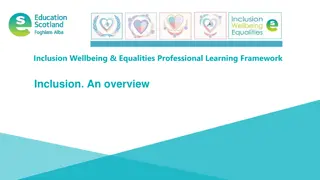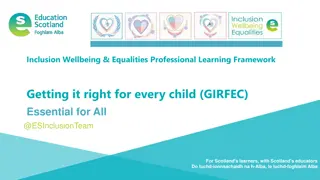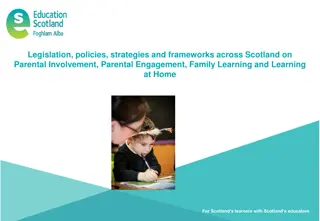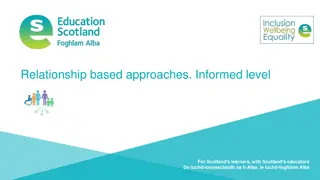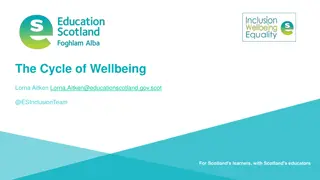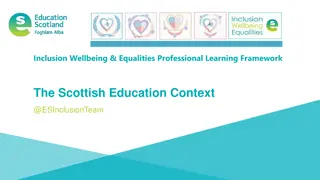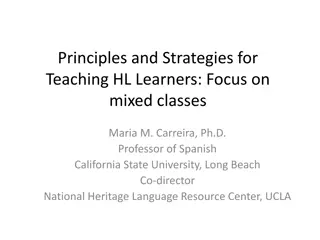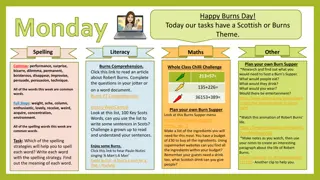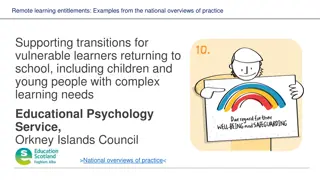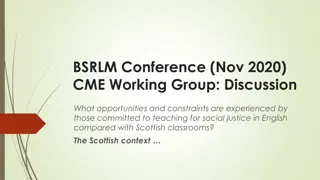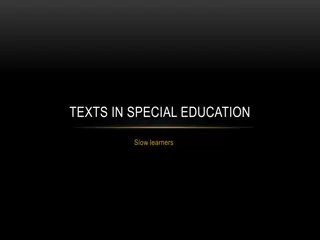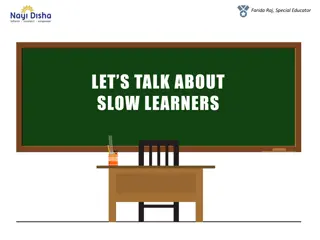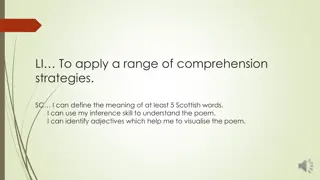Importance of Learning at Home for Scottish Learners
Learning at home is a critical aspect of a child's development and education in Scotland, with parents playing a vital role. The Scottish Schools (Parental Involvement) Act of 2006 emphasizes the significance of parental involvement in children's learning. However, there is a need for better understanding and clarification on what learning at home entails. Research shows that activities outside school greatly impact a child's academic success and overall well-being. Enhancing learning at home can have lasting positive effects on children's achievements and resilience.
- Scottish learners
- Parental involvement
- Education in Scotland
- Learning at home
- Importance of learning
Download Presentation

Please find below an Image/Link to download the presentation.
The content on the website is provided AS IS for your information and personal use only. It may not be sold, licensed, or shared on other websites without obtaining consent from the author. Download presentation by click this link. If you encounter any issues during the download, it is possible that the publisher has removed the file from their server.
E N D
Presentation Transcript
Learning at Home For Scotland s learners with Scotland s educators
Scottish Schools (Parental Involvement) Act 2006 The Act recognises the vital role that parents play in children s learning and development. Duties within the PI Act: Parental Involvement Act 2006 and Statutory Guidance Parents should receive information and support to help develop their child s learning at home and in the community. Learning at Home Home / School partnership Learning at home should be included in the Local Authority s Parental Involvement Strategy. Parental representation For Scotland s learners with Scotland s educators
Review of the impact of the Parental Involvement Act 2006 (NPFS, 2017) There was confusion and a general lack of understanding among parents and staff about the difference between homework and the concept of learning at home. Further work is required on the learning at home strand of the Parental Involvement Act (2006). Headteachers identified learning at home as an area for further development. Clarification is needed on the definition of learning at home. For Scotland s learners with Scotland s educators
Review of Learning at Home https://education.gov.scot/resources/review-of-learning-at-home/ For Scotland s learners with Scotland s educators
What is Learning at Home? Parents have a vital role in a child s learning and development throughout their lives. Early learning and childcare settings, schools and communities can also play a key part in recognising, developing and resourcing this. Learning at home is the learning which happens in the home, outdoors or in the community. It can take place through everyday activities that families already do and can overlap with aspects of organised or active learning activities (Scottish Parental Involvement Officers Network, 2018). For Scotland s learners with Scotland s educators
Why is Learning at Home important? Research has shown that around 80% of the difference in how well children do at school is dependent on what happens outside the school gates. (Rasbash et al 2010; Save the Children 2013) Learning at home is crucial for children to learn and develop. Research shows that learning at home can have significant immediate and longer-term impacts on children in different ways: a child s early learning later achievements nurture resilience wellbeing social mobility skills for life For Scotland s learners with Scotland s educators
Why is Learning at Home important (Cont.)? In Scotland children spend approximately 15% of their waking hours in school, which leaves 85% spent at home and in the community, with huge potential for learning. OECD Report 2014 For Scotland s learners with Scotland s educators
How can Learning at Home happen? A range of events including: play, leisure activities, fun events, sports, trips, cultural or volunteering experiences. It can also happen through: curriculum related activities, homework, reading and sharing books. For Scotland s learners with Scotland s educators
What do we mean by the home learning environment? Combination of everything in a home Time that a child spends out and about which affects their learning and development - including: having space and time to learn toys, books, outings people who provide the love, security, encouragement, conversation and positive role models to help a child to thrive A good home learning environment encourages children and young people to have positive attitudes to learning, to be curious, creative and to have confidence in themselves. https://education.gov.scot/parentzone/learning-at-home/home-learning-environment/ For Scotland s learners with Scotland s educators
Why is the home learning environment important? Research shows that when parents and carers engage in their children s learning, and when children and young people live in a supportive home learning environment, it improves their attainment and achievement (2024 National Improvement Framework and Improvement Plan, 2023). For Scotland s learners with Scotland s educators
Home learning activities - Growing up in Scotland Study Children from less advantaged households are less likely to experience a wide range of home learning activities than children from more advantaged households. Children who experience a wide range of activities like being read to, singing nursery rhymes and drawing, from an early age score higher in cognitive ability tests at age 3 than children with less experience of these activities. Parenting and children s activities in the early years can make a difference to children s outcomes. The influence of home learning environment was over and above that of standard measures of family socio-demographic factors such as parental education, socio-economic status and income. (Melhuish, 2010) For Scotland s learners with Scotland s educators
Discussion What does learning at home look like in your setting/school? For Scotland s learners with Scotland s educators
Examples of Learning at Home (including Homework activities) Learning at Home Learning at home / homework activities: Family challenges/challenge cards, adventures with Teddy, board games, shopping, lego building, STEM challenge, pick and mix homework, sacrament preparation, model making, newsletter, powerpoints on favourite/interesting things, cake decorating taking photographs, 100 things to do before you re 13 Families learning together: Family learning events or homework club, PEEP / bookbug, parental reading programme, photography club, outdoor learning, cooking, crafts, work with fathers Sharing learning: Nurture groups, Maths recovery lessons (with children), child led workshops, outdoor learning, stay and play, open afternoons, homework fun challenges, P1 home learning reading block, class assemblies, careers day, talk time homework, shared learning exercises (Art/IT practical) Others: Reviewed reading policies, review and planner, tracking achievements, personal learning planning, target setting, GIRFEC review meetings Helping parents: ESOL, L@H guidance leaflets, parent packs, workshops, videos, cafes, home-link worker, parent mail/text messages, homework clubs, notes of intended learning Communication methods: Show my homework, website, twitter app, homework app, Glow, RM Easimaths, leaflets For Scotland s learners with Scotland s educators
Examples of Learning at Home (including Homework activities) Learning at Home Learning at home / homework activities: Home learning bags, building on achievements from home, homework tasks with family members, Ted s adventures at home, home-link initiatives, STEM, travelling dolls, lending library Sharing learning: Class reward system, home-school sharing of achievements, child led workshops informative learning opportunities provided by teachers Families learning together: Family homework group Parent-child homework club Others: Parents encouraged to support learning through parents meetings, work with school to address issues, target setting in user friendly language Helping parents: Stay and play sessions, parental workshops, open days, special events, planned support for parents on supporting reading at home, written materials on what child is learning, information booklet on supporting at home Communication methods: Online learning journals, daily conversations, interactive online resources, blog, learning profiles, home-school diaries, text messages, noticeboards, photographs For Scotland s learners with Scotland s educators
Research Learning at Home Topics emerging in research discourses on effective Learning at Home covers the following themes: Positive parenting experiences Parent-child relationships Stimulating home learning environment Educational activities Parenting styles Child development Homework / effectiveness of homework primary / secondary Supporting parents to help their children learn at home Staff training/development building the capacity of practitioners For Scotland s learners with Scotland s educators
Examples of Resources available on Parentzone Scotland For Scotland s learners with Scotland s educators
https://education.gov.scot/parentzone/ For Scotland s learners with Scotland s educators
Family Learning Resources on Parentzone Scotland Meet the I am a characters Multiplying Milli And Dividing Dec Mike And Eiliyah For Scotland s learners with Scotland s educators
Family Learning Resources on Parentzone Scotland https://education.gov.scot/parentzone/learning-at-home/supporting-science-at-home/ For Scotland s learners with Scotland s educators
Supporting Literacy at Home https://education.gov.scot/parentzone/learning- at-home/supporting-literacy-at-home/ For Scotland s learners with Scotland s educators
Supporting Numeracy at Home https://education.gov.scot/parentzone/lear ning-at-home/supporting-numeracy/ For Scotland s learners with Scotland s educators
Enjoy the little things because one day you will look back and realise, they were the big things .. It s all the little things that make it work . (Headteacher) For Scotland s learners with Scotland s educators
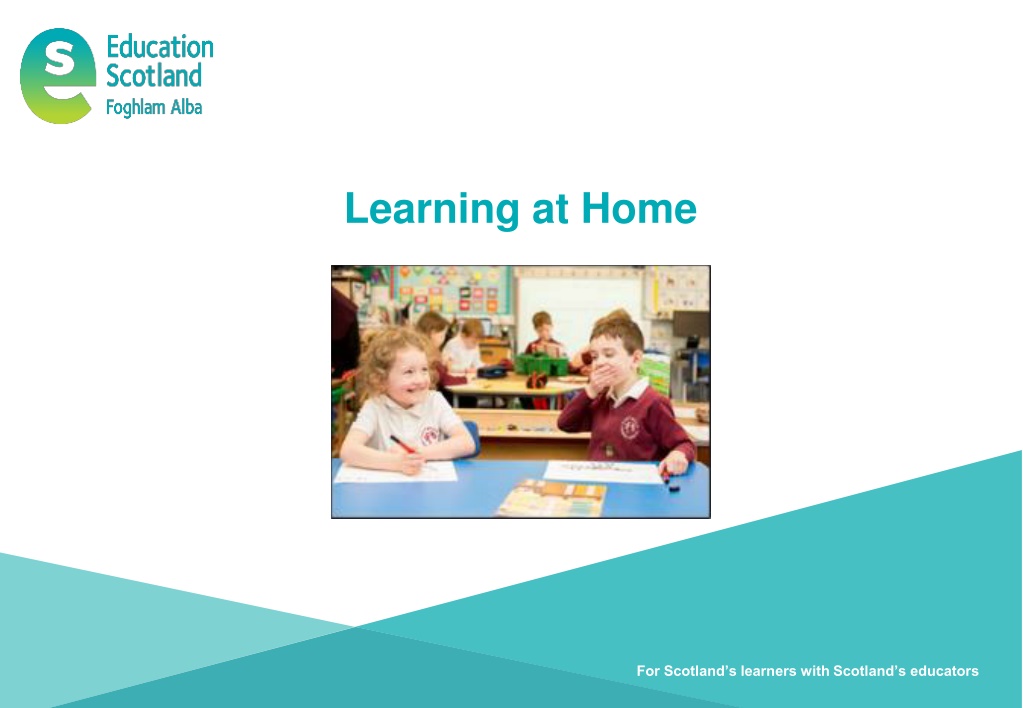
 undefined
undefined





